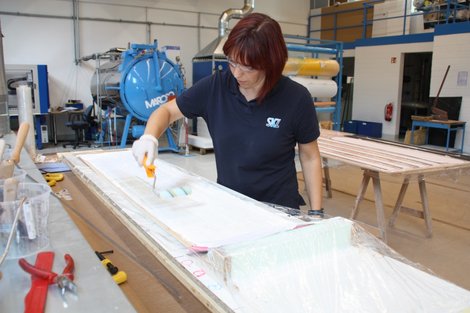Material monitoring in fibre composites

Together with scientists from Fraunhofer Institutes and other partners, the experts at the SKZ Plastics Centre in Saxony-Anhalt are developing "intelligent" components made from fibre-reinforced composites. Innovative, cost-efficient sensors in the material could be used to monitor wind turbine rotors during operations, for example.
Fibre-reinforced plastic is an exceptionally versatile material. Very strong and very light, this construction material can be pressed into almost any shape and therefore allows for the production of custom-made components. Among other benefits, this saves materials and therefore money. Due to their many adaptable properties, fibre composite plastics already have a wide range of applications in various industrial sectors. They are the suitable material for aircraft, boats and cars, for medical technology products and also for the rotor blades on wind turbines.
In Saxony-Anhalt, work is under way to make fibre composite plastics into an "intelligent" building material, for the rotor blades on wind turbines, for example. These blades are subject to high mechanical loads due to environmental influences. If the wind blows too strongly, for example, the systems are switched off for safety reasons – and no longer supply any green electricity. The SKZ in Halle (Saale) is participating in the development of a fibre composite plastic that can measure the actual mechanical stress on the rotors.
Sensors in fibre composite plastics
The focus of this development is on the use of cost-effective, specially developed filament sensors which are based on what are referred to as pseudo-elastic shape memory alloys in the material. "We could introduce fine sensor wires directly into the fibre composite structure during the manufacturing of the component for a rotor blade. The change in electrical resistance in the sensor with a higher load on the rotor blade allows for the strain to be determined and therefore, for the system to be monitored," says Dr Jana Fiedler, Head of the Working Group for Composites at SKZ in Halle (Saale), explaining the principle. These sensors are the special field of research at the Fraunhofer Institute for Machine Tools and Forming Technology IWU in the neighbouring federal state of Saxony, where they are being developed. They allow the rotor blades to be designed to withstand high loads and ultimately, for the non-destructive testing of the components. The SKZ, whose employees research technologies in the production of fibre composite plastics, is investigating how the sensors that have been developed in-house can be connected to the fibre composite structure, and the factors to be taken into account when selecting materials. The samples for manufacturing are subsequently tested and analysed by the project group at the Fraunhofer IMWS in Halle (Saale) with the goal of assessing the quality of the measurement signal. In the Central German research project EFFI-Sens, the plastics experts at SKZ are working together with scientists from the Fraunhofer Institutes.
Interest from the world of business
The EFFI-Sens research project is being supported by the Federal Ministry of Economics and Energy as part of the Collaborative Industrial Research Programme (DE: Industrielle Gemeinschaftsforschung, IGF). On the basis of this innovation, components made from sensor-equipped fibre composite plastics could also be designed to withstand loads in other industrial sectors and be subjected to non-destructive testing and continuous monitoring at the same time. This means a high degree of cost effectiveness and safety are manageable even with growing customer demand for individual components and the associated variety of versions. Accordingly, the interest from the world of business is immense. In a committee accompanying the project, medium-sized German companies from Thuringia, Saxony and Saxony-Anhalt are partaking in the further development of the fibre-reinforced plastics and putting the components and assemblies made from the materials to use. In Saxony-Anhalt, these include the innovative manufacturer of aerobatic aircraft XtremeAir in Cochstedt and FVK Faserverstärkte Kunststoffe (fibre-reinforced plastics) Dessau GmbH.
Centre of expertise for fibre composite technology
The SKZ in Halle (Saale) is the centre of expertise for fibre composite technology in Saxony-Anhalt and is also active in the area of education and research. "Our goal is to develop new technological concepts for the use of fibre-reinforced composites, such as those required in the areas of wind energy, design applications and mobility in particular," explains Plastics Engineer Dr Jana Fiedler. "On the basis of consulting, production and the characterisation of fibre-reinforced composites, in particular, we support all small and medium-sized companies in the use, quality assurance and further development of these materials."
The SKZ plastics centre in Halle (Saale) has a long tradition, especially as a training location for the area of plastics processing. As the former Central Institute for Welding Technology, in the era of the former East Germany, the location was also home to a small team which addressed the welding of thermoplastics and the training and education in this field. In 1990, SKZ in Würzburg assumed responsibility for the training area of plastics welding. Currently, for instance, some 90 percent of all Lamination Experts who are tested according to DVS Guideline 2220 are trained here.
Author: Michael Falgowski
Read HERE what Saxony-Anhalt offers in the field of smart materials. HERE materials think smart.
